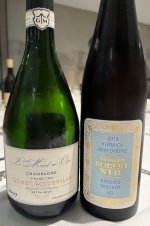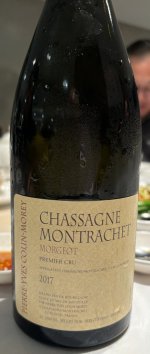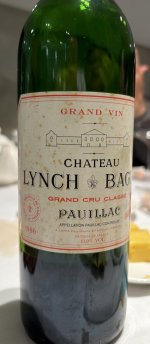Chinese Meal
- Thread starter OzPiper
- Start date
You are using an out of date browser. It may not display this or other websites correctly.
You should upgrade or use an alternative browser.
You should upgrade or use an alternative browser.
SmokingPipes.com Updates
Watch for Updates Twice a Week
Mmmmmm Champagne Grand Cru.
And an 86 Lynch Bages! WOW...nice!
And an 86 Lynch Bages! WOW...nice!
Couple of foodies/wine lovers with their wives
At a suburban Chinese
Good food, great company
At a suburban Chinese
Good food, great company
I just don't think "wine" when I think of Chinese food, especially champagne and Riesling. But, if you say so. I may have to try it.
Can't see any food... is "Chinese meal" a code name for 4 bottles of booze?
My mission in life - wine matching with Asian cuisineI just don't think "wine" when I think of Chinese food, especially champagne and Riesling. But, if you say so. I may have to try it.
Japanese is very food friendly. As us Vietnamese
Chinese can be, with a bit of forethought
Indian - now that is a challenge
Always a problem getting pics of the good before the chopsticks descend like vulture beaksCan't see any food... is "Chinese meal" a code name for 4 bottles of booze?
Did you mean wine friendly instead of food friendly?
Wouldn't you pair a Saki with Japanese food?
The problem with Indian is that it is just so diverse, so many possible combinations.
But, this sounds like fun. Is it a wine club? Or just a personal journey.
And, why the hell won't you invite me over for dinner?
Wouldn't you pair a Saki with Japanese food?
The problem with Indian is that it is just so diverse, so many possible combinations.
But, this sounds like fun. Is it a wine club? Or just a personal journey.
And, why the hell won't you invite me over for dinner?
And, why the hell won't you invite me over for dinner?
There's a waiting list with priority to his fellow countrymen

Riesling is an incredibly versatile wine and pairs exceptionally well with Asian dishes including spicy ones.I just don't think "wine" when I think of Chinese food, especially champagne and Riesling. But, if you say so. I may have to try it.
Light mouthfeel, sweet, fruity, yet goes right to your head... it is the Mountain Dew of wines.Riesling is an incredibly versatile wine and pairs exceptionally well with Asian dishes including spicy ones.

A Chinese meal with 4 friends
View attachment 339806View attachment 339807View attachment 339808
Nice food
Great company
When I saw the title, I was expecting this:

Democracy Manifest - Wikipedia
A succulent Chinese meal?
LOL! You beat me to it.
The video shows a man being arrested by Australian police at a Chinese restaurant. As the police forcibly detain him, he remarks in a loud and stentorian tone, "Gentlemen, this is democracy manifest!", "What is the charge? Eating a meal? A succulent Chinese meal?", "Get your hand off my penis!", and after an aborted attempt by a police officer to headlock him, "I see that you know your judo well."
Sake is technically beer.Did you mean wine friendly instead of food friendly?
Wouldn't you pair a Saki with Japanese food?
Actually... beer is when you cook the sugars and starches out of a grain and then that is fermented. Saki is a wine, because the sugars are fermented in the grains.Sake is technically beer.
In sake starches are converted to glucose in the rice (a grain) by enzymes called koji, this process is saccharification, then converted to alcohol by yeast. This is multi-stage parallel fermentation meaning the saccharification and fermentation happen in the same tank at the same time.
In beer starches are converted to glucose in the malt (a grain) by boiling, this process is saccharification, then converted to alcohol by yeast. This is multi-stage fermentation because the saccharification and fermentation happen in different stages in different tanks.
In wine the glucose doesn't need to be converted from anything because it exists naturally in grapes (a fruit). The yeast just ferments what's already there. This is single fermentation.
So while not exactly a beer.... it's a whole lot closer to being beer than wine.
In beer starches are converted to glucose in the malt (a grain) by boiling, this process is saccharification, then converted to alcohol by yeast. This is multi-stage fermentation because the saccharification and fermentation happen in different stages in different tanks.
In wine the glucose doesn't need to be converted from anything because it exists naturally in grapes (a fruit). The yeast just ferments what's already there. This is single fermentation.
So while not exactly a beer.... it's a whole lot closer to being beer than wine.
I had sake last week at a knockout Japanese lunch last week.Wouldn't you pair a Saki with Japanese food?
I’m a sake neophyte.
Japanese food is so versatile when it comes to pairing with wine/drinks.
I have organised several Japanese dinners with champagne.
I’m about to do one with Rieslings soon.
And, why the hell won't you invite me over for dinner?
Please let me know whenever you gentlemen are planning a trip to Sydney.There's a waiting list with priority to his fellow countrymen
I’d love to show you around our beautiful city. And have a meal or two with you.
Unfortunately there are no pipe-friendly venues other than beer gardens with cigarette smokers.
Thank you for schooling the guy who owns a winery on how wine is made, ha ha.In sake starches are converted to glucose in the rice (a grain) by enzymes called koji, this process is saccharification, then converted to alcohol by yeast. This is multi-stage parallel fermentation meaning the saccharification and fermentation happen in the same tank at the same time.
In beer starches are converted to glucose in the malt (a grain) by boiling, this process is saccharification, then converted to alcohol by yeast. This is multi-stage fermentation because the saccharification and fermentation happen in different stages in different tanks.
In wine the glucose doesn't need to be converted from anything because it exists naturally in grapes (a fruit). The yeast just ferments what's already there. This is single fermentation.
So while not exactly a beer.... it's a whole lot closer to being beer than wine.











